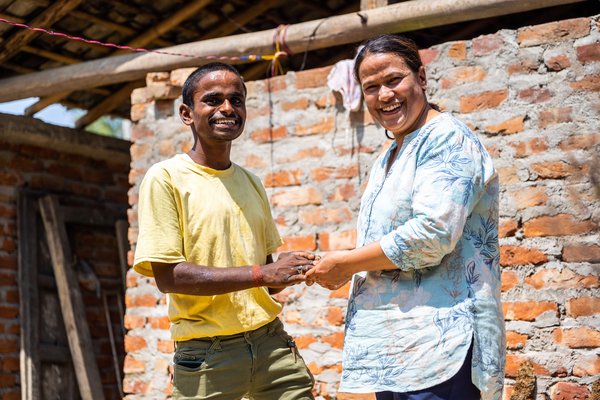Bringing the world’s poorest out of the shadows

Charlotte Walker - Senior Media and Communications Officer
The Leprosy Mission is calling on governments to make mental health services available to the world's poorest people. It is advocating for mental health services to be integrated into government primary healthcare systems. It is also asking for mental health support to be part of government leprosy programmes.
On World Mental Health Day, The Leprosy Mission is celebrating its successes while stepping up the fight for mental health justice.
Having worked closely with the government of Sri Lanka, it is proud that mental health support is now part of the national leprosy strategy. In Nigeria, The Leprosy Mission is the government's chosen technical partner for mental health. It is supporting the Nigerian government to deliver mental health services. Crucially, it is advocating for measures to be put in place to ensure they are made available to people affected by leprosy.
The work in Nigeria follows The Leprosy Mission's success in appealing for a new Mental Health Bill. Through its Open Minds project, funded by Comic Relief, the new bill was introduced in Nigeria in 2023 and replaced the Lunacy Act 1958. The Lunacy Act discriminated against people with mental health conditions.
Latest figures from the World Health Organization show that nearly a billion people globally have a mental disorder. It is thought that 80% of people experiencing a mental disorder in their lifetime come from low and middle income countries. In the majority of these countries, mental health services are not part of primary healthcare systems. This can make it extremely hard and costly to find mental health support.
Just as climate change impacts the world's poorest people the very most, so does poor mental health. More than a billion people today are affected by Neglected Tropical Diseases (NTD), which include leprosy. NTDs are diseases that need not exist in the 21st Century and affect the world's poorest. The WHO reports that people with NTDs have higher rates of depression, anxiety, self-harm or suicidal thoughts. This is because of the stigma and prejudice which still surround these diseases. Yet the people they affect are those least likely to have access to mental health support.
Chief Executive of The Leprosy Mission, Peter Waddup, said they are working tirelessly to overturn this injustice.
He said: "Studies show the majority of people affected by leprosy have poor mental health. Leprosy is such a cruel disease physically. If leprosy is not treated in its early stages then it can lead to the loss of limbs and blindness. Yet many say it is the prejudice surrounding the disease that is the hardest to bear.
"I have sat with people who have been subjected to unimaginable cruelty. They have been beaten, set fire to and cast out of their families and communities. All because they have leprosy, a completely curable disease.
"Overnight the warmth of family life is replaced with the desolation of life on the streets. They are the untouchables, the unwanted. It’s small wonder that the disease goes hand in hand with anxiety and depression.
"Many people affected by leprosy have experienced so much hurt that they choose to end their life. This is unbelievably tragic. I do believe, with the right support, there is hope and a better life for every person we are here to serve. We have witnessed some tremendously encouraging healing in people's mental health and lives."
Mental health services have often been seen as an ‘add on’ in the field of overseas development. Following significant advocacy, mental health was included in the Sustainable Development Goals. This is the United Nations' 2015 roadmap for development until 2030. Still, many argue there are not clear indicators within the SDGs to accurately measure mental health. They say this hinders its progress.
Peter said The Leprosy Mission is working to provide mental health support for every leprosy patient it supports.
"We would love to provide counselling sessions to aid every leprosy patient’s recovery," he said.
"We know that if someone is able to share the burdens they are carrying they are more likely to feel loved and valued. And if they feel loved and valued then they are more likely to practice self-care.
"In leprosy patients, this can mean taking the time to care for and protect numb hands and feet. By doing so they are less likely to become injured and develop ulcers which can, in turn, cause disability.
"Leprosy is a disease which needs to be treated holistically. You cannot separate physical and mental health."